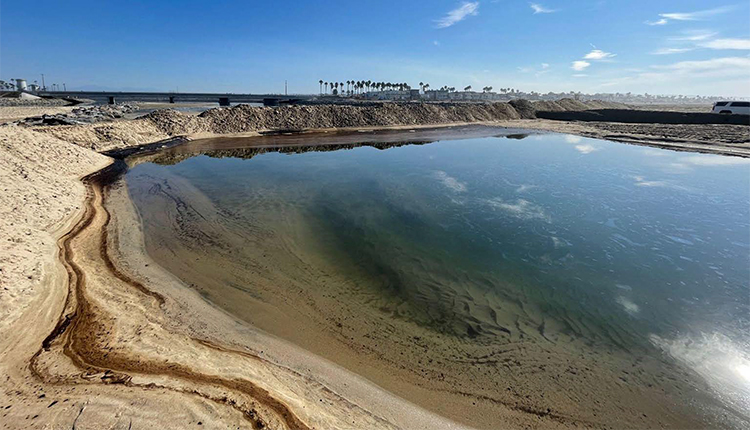Pacific Ocean oil spill affects shops, wildlife in Huntington Beach, California |
| By Kristin Ely |
The spill leaked 144,000 gallons of oil into the ocean, closing beaches. An oil spill from a pipeline discovered off the coast of Huntington Beach, California, Oct. 2, had both ecological and economic impacts on the area. The oil slick plume measured an estimated 5.8 nautical miles long and ran from the Huntington Beach Pier down into Newport Beach. Around 144,000 gallons of oil are estimated to have spilled. California Gov. Gavin Newsome declared a state of emergency the ocean was closed from the Pier to the Santa Ana River jetty while personnel and booms were deployed to contain the spill. The closure had a significant impact on area retailers. According to the Associated Press, traffic was down significantly at area beaches and shops “selling everything from bikinis to stars-and-stripes boogie boards to sand toys and fishing gear” took an economic hit because of the spill. Huntington Surf & Sport relies on beachgoers and surfers for its retail business. “We’re kind of second priority [to the ocean]. Whenever they are walking by and they see a cool sweatshirt or T-shirt, that’s usually how we get our business,” says manager Aaron Will. The store rents out hard boards, soft tops, body boards and wetsuits, but during the ocean and beach closure, the store wasn’t able to rent out any watersports equipment. “Our board rentals took a big hit obviously, because no one could get in the water,” says Wills. State beaches reopened on Oct. 11 after coastal ocean and wetlands water quality testing results showed non-detectable amounts of oil-associated toxins in the ocean water. “I was very thankful that they were able to get it cleaned up to a point where people could get back into the water,” says Will. Due to the oil spill, the city cancelled the final day of the Pacific Airshow Oct. 3. The air show typically marks the end of the busy season for Huntington Beach tourism, according to Will. Business will pick back up again in November with the holiday season. Wills doesn’t remember anything affecting business at the store as dramatically as the oil spill since the COVID-19 quarantines in 2020. Though, he says, “In the long run, the quarantine kind of helped out due to the fact that Huntington Beach was a little bit more open compared to the surrounding areas in general.” The spill also affected rescue efforts at the nearby Wetlandand Wildlife Care Center. The release of five brown pelicans and one Brandt’s cormorant from the Wetlandand Wildlife Care Center were delayed because of the spill. These birds had been ready for release since Oct. 4, but the release was pushed back to Oct. 19 until the center received an “all clear” from the incident command post, that a clean and safe environment is now available for them, according to the organization’s Instagram page. “We held back over 200 birds that need release” stated Debbie McGuire, Executive Director of the WWCC. “Even though they were not oiled, they became indirect victims of the spill” she added. “These seabirds require and deserve a clean environment, and now it is possible.” Surfrider Foundation has also encouraged people to photograph tar balls and oil on the beaches and report them through an app called ArcGis QuickCapture. By doing this, the foundation can inform the official clean up teams where oil and tar is washing up and they can send out teams to clean the beach. “Oil contains hazardous chemicals, and for safety reasons, we recommend not handling tar balls or any oil,” Surfrider Foundation says. |
